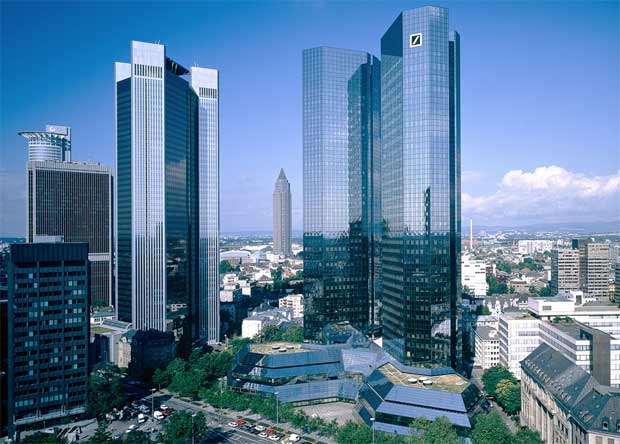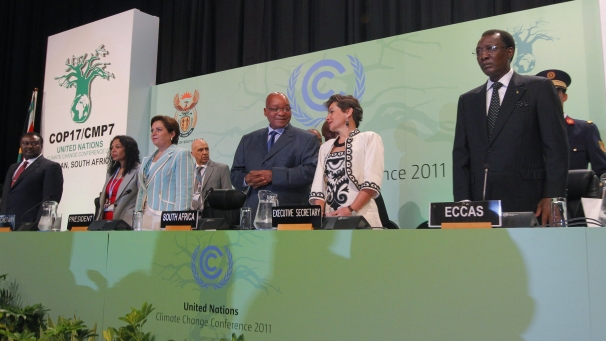COP17 - A View From the Ground
Fleishman-Hillard South Africa was in the fortunate position to have a staffer in Durban at COP17 for 11 eventful days. Aside from her involvement at client and business events, her availability to attend side-events hosted by stakeholders big business, both institutional and commercial finance bodies, local and global governmental forums and NGOs, including open useful dialogue sessions. For those of you interested in a peek into the lesser reported views brought forward by business leaders at COP17, below is a blog post for your reading pleasure…
Revealing tales from behind the green curtain
Posted Tuesday, 6 December from #COP17
Behind-the-scenes COP17 commentary by Brazilian-born, German-reared politician and business executive Caio Koch-Weser (currently Vice Chairman of Deutsche Bank) revealed some surprising insights.
As you’ll see from the link above, Mr Koch-Weser does not like to brag about his salary or the value of his estate. But looking at his CV, one could perhaps hazard a guess…
- Chair of the Global Climate Partnership Fund (a US$200 million Public Private Partnership, run by the German Ministry with equity capital to assume part economic risk, and co-funded by Denmark and the International Monetary Fund – to help dev-nations Brazil, Chile, China, India, Indonesia, Mexico, Morocco, South Africa, the Philippines, Tunisia, Turkey, Ukraine and Vietnam reduce energy consumption and greenhouse emissions by at least 20%).
- Executive Committee Chairman of the European Climate Foundation.
- Former member of UN Secretary General Ban Ki-Moon’s High Level Advisory Group on Climate Finance.
- Former Vice-Minister in the German Federal Ministry of Finance.
- Prior to that, World Bank top dog…
I’m deviating. So let’s get back to what was discussed. The International Emissions Trading Association / IETA’s CEO and President, Henry Derwent (himself a former British Parliamentarian) pulsed Mr Koch-Weser about the potential fate of COP17 negotiations, and about the role of business in making the $100 billion Green Climate Fund a success.
His thoughts are, we were led to believe, in line with proposals from a new briefing “Durban Must Clear the Path for Low-Carbon Investment” by Deutsche Bank – the world’s most highly leveraged financial institution, which made a $3.3 billion profit last year, but was involved in a huge civil law suit this year for losing its customers money on a futures interest rate hedging scheme.
While Deutsche Bank certainly stands out for the level of commitment and amount of work it’s done to make climate finance work for the Bank’s stakeholders, “we have a very long way to go,” says Mr Koch-Weser. “Having COP as a client of the Bank’s has helped us understand the level of resource productivity we need, given the climate challenge.”
While Deutsche Bank will be carbon neutral by next year, it is not only reputation that’s at stake, he says, “but moreover, to have a business the day after tomorrow.“
“Germany has leading experience in policy for some of the largest scale projects in the world, and although South Africa is lagging behind, the country has shown great leadership in saving the COP process, which could easily have failed after Cancun, and I commend President Jacob Zuma for that. “His framework for a successful climate change regime is based on the TLC concept of transparency, longevity and certainty. “Governments and business must get over their suspicion of each other, and together get fit for implementing the Green Climate Fund,” he goes on to say.
The GCF will reflect at country level through NAMA (Nationally Appropriate Mitigation Actions that are by-country greenhouse gas emission reduction targets). “The role of business would be to contribute directly to the GCF or NAMA targets with the World Bank’s support, to ensure the world does not endure another failing of the CDM [clean development mechanism] scenario, and banks need to put in the correct instruments and guarantees,” says Koch-Weser. “It is the International Finance Corporation’s role to assess risk and the scenarios for mezzanine, private and international financing. For developing nations, where taxpayers cannot afford to foot the bill, an interim financing net is needed.”
Mr Koch-Weser, who has engaged with 16 of the world’s top Finance Ministers at COP, and the likes of vocal climate change activist Nick Stern (noted for producing films such as Bugsy Malone and The Mission), says there has been respectables outcome so far at COP17, especially now because the financial leaders of the worlds are fully engaged in the process.
“Instead of UN multilateral trade grants, we are bringing the private sector in,” says Koch-Weser. “The UN Chairman and Norwegians did not do enough. SA Minister in the Presidency Trevor Manuel (who co-chairs the Green Climate Fund) has picked up many ideas. There is a richness of proposals, but a lot of process disagreement in terms of the private sector and World Bank’s role at COP17, which has made a lot of good ideas fall through.”
Mr Koch-Weser continues: “Due to the laborious UN democratic process and bottom-up coalitions, we as business globally are not waiting for governments to agree on climate change actions. We must push ahead with action. Also, the agreement on the Fund as we envisioned it, was not fully taken on board – very disappointing.”
He says a comparable concord between World Bank and G20 countries is in doubt as there is an impossible range of issues (not just climate) being tabled at G20 discussions (including agriculture and food security) but the financial crisis sweeping through Europe and the US may hamper any progress.
Mr Koch-Weser described the “power that be” thus:
Maximum legitimacy: governments and the UN with its democratic processes
versus
Maximum efficiency: financial institutions or the G20 – slated to become the G8.
“The G20 lifted to HEPS level becomes more PR than effect,” he exclaimed. “The coalition was composed to serve markets, but is now right to tackle the climate issue with force.”
How to eliminate suspicion of the private sector for funding?
Mr Koch-Weser is of the opinion that the Global Climate Fund can easily become overly bureaucratic, rendering it ineffective. He says Minister Manuel, who was on the discussion group, is not overly optimistic of the GCF’s success – hence the case for other finance instruments.
As many have said during COP17, he reiterated that a lot of good single case studies of climate mitigation and adaptation success stories were brought forward, but nothing close to scaling up solutions for a global solution, mainly because countries and legislation differ so.
“Banks want project developers to deal with this challenge,” says Koch-Weser. “A lot of other discussions on climate funding are in the $7-12bn range, so GCF’s $1bn is very conservative. Unfortunately it looks as if the Chinese are walking away due to the complication of issues among countries.”
How can we create prices and incentives to boost change?
“An agreement on carbon price and tax are central, which will then shuttle down to NAMAs (nationally appropriate mitigation actions) and feed-in tariffs at country level. People spending their time promising short-term (3-4 year) stability are wasting their time,” says Koch-Weser.
“Energy efficiency in our dirty processes seems like a low-hanging fruit – it is a negative cost if you fix your processes but that is an agent issue. Demand must be driven by policy and incentives.”
Why so suspicious of markets?
“More countries now have that internal debate. Consumer product and business is now pretty clearly broadly defined – and that is where the change should be driven. Business should be going to its regulator and demanding policy to satisfy its needs,” he says.
“Climate-smart solutions for super grids can be driven by business, with a full plan and budget self-sufficiently ready. In consumer goods, energy, transport – the same rules apply. Don’t go to report to the UN, but to launch your own solutions!”
“Haven’t you noticed that the side-show at COP is private sector and civil society? Because at COP nothing is happening. I know there are many political obstacles but where is most energy and innovation?”– Koch-Weser
“The bottom-up emphasis in science and research shows it works better, especially in the developing world. Business leaders are saying forget global frameworks: a carbon footprint of 450 CO2 ppm or 2 degrees lower will not be reached in this way,” he continues.
“Frankly, it is a much bigger discussion – migration to water and food security and governments are not on top of these issues. Procedural democracy (voting instead of debate) is done by government officials who mostly have never seen real life. I would start with the cement industry, consumer goods which are closer to consumer behavioural change, and drive business backing from there on.”
Rio+20 is like an answer looking for a question
“We as business could use the upcoming Rio+20 conference as a new message transfer for bottom-up approach to business coalitions, provincial and cross-country coalitions,” he says. “There is still very little framework on responding on climate issues in a unified way in the UN.”
Suggestion to Chinese private sector on how to make demands heard to huge government who run everything?
China has developed an excellent bottom-up solution to climate change: a social plan, involving local governments, seven Cap and Trade regimes and energy efficiency standards.
“China has a great government structure and vast experience,” says Koch-Weser. “The next generation of China will have a very different mind-set and the party has the wisdom to bring in the new highly trained modern thinkers and allow more participation by community members.”
Where will COP17 get by Friday?
“The outlook is more optimistic than I expected – it certainly was better than Cancun where the UNFCCC democratic process nearly failed completely,” he concludes.
These are Koch-Weser’s salient take-outs from COP17:
- For the EU to go ahead with the Kyoto Convention, amid so many countries leaving, is quite remarkable.
- I think China will achieve their own targets and is considering its own commitment targets for 2020.
- Brazil is in a renewable-friendly space with hydro, ethanol, solar, but negligent on forestry.
- India is the big puzzle: emitting only 3-4 tonnes per person per year, why should they have binding commitments? It doesn’t make sense for India to do it the wrong way, though.
- South Africa: Zuma and his Ministers play a critical role in pushing BASIC countries in the right direction, and for that I commend them!
By my conclusion and for even measure, here’s what I was just mailed – was apparently on Occupy Wall St.’s Facebook page yesterday:
SIDE-BAR:
The daily diary of #COP17 behavioural observations from FHSA Sustainability’s Lani Botha can be a accessed via http://greenberetclub.blogspot.com or via her Twitter handle @LaniBusyB, where past photos and links are available.
Find Out More
-
The metaverse – Is it important for your business?
June 2, 2022
-
First Year At A Job And It Had To Be 2020!
June 11, 2021
-
PR trends accelerated by the COVID-19 pandemic
February 19, 2021




